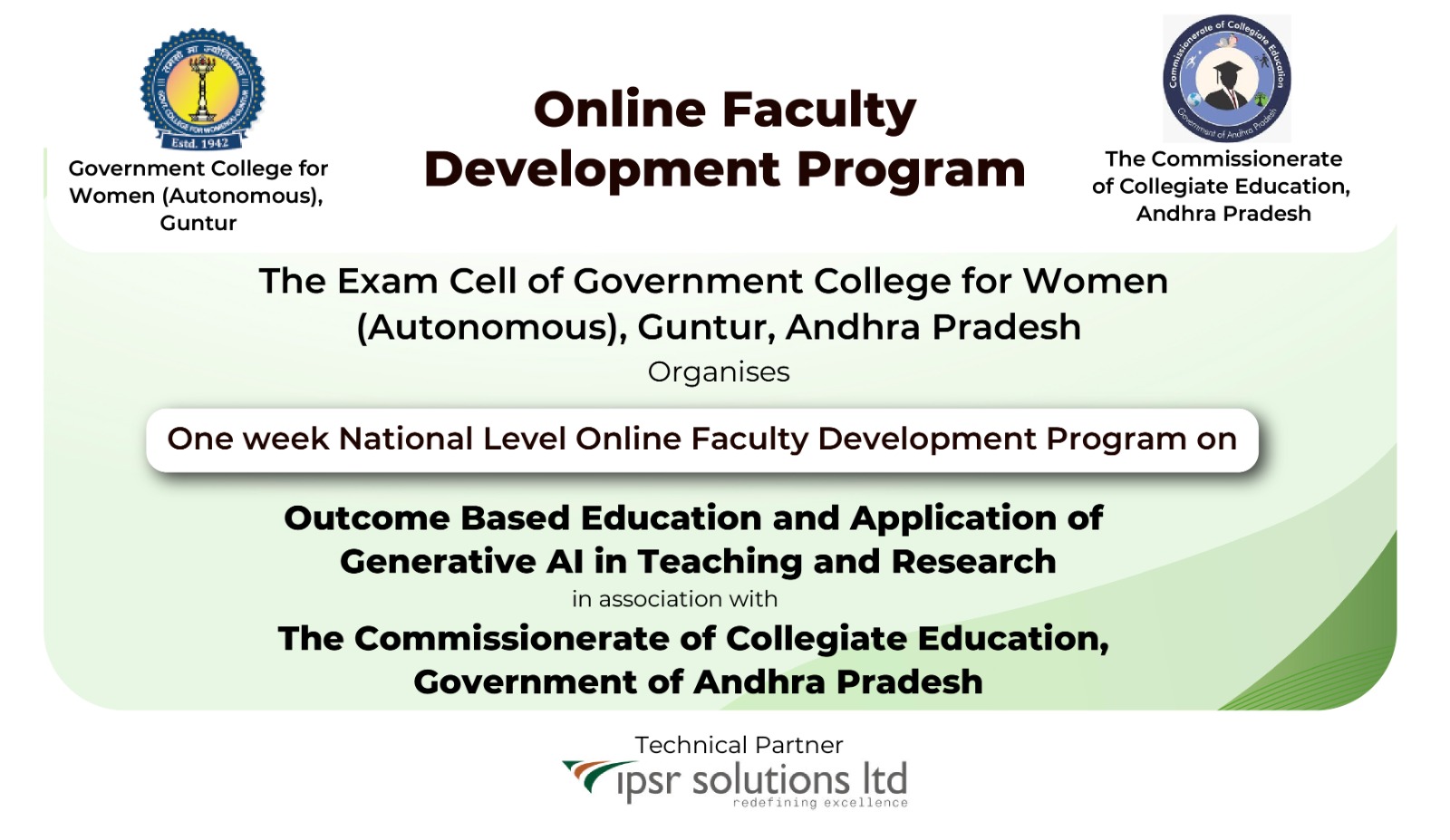
Outcome-Based Education (OBE) is a learner-centred teaching approach focused on achieving specific learning outcomes. It defines what learners are expected to know, demonstrate, and apply after completing a course. This approach ensures that the curriculum, teaching methods, and assessments align with predefined outcomes to improve the quality and relevance of education.
OBE emphasises skill development, critical thinking, and real-world problem-solving. Instead of traditional grade-based assessments, OBE measures students’ ability to demonstrate competencies through projects, presentations, and practical tasks. This ensures that education focuses more on producing competent graduates equipped for professional and personal success.
Generative AI, a branch of artificial intelligence, has emerged as a transformative tool in education and research. It enables the creation of content, solutions, and insights through algorithms trained on vast datasets. Generative AI tools like chatbots, language models, and data analyzers are revolutionizing how educators deliver content and how students engage with learning materials.
In teaching, Generative AI can help create customized lesson plans, generate quizzes, and assist in grading assignments. These tools save time for educators, allowing them to focus more on interactive and value-added teaching methods. For students, AI-driven tools provide personalized learning experiences by adapting content to their individual needs and learning pace.
Generative AI accelerates research processes such as literature reviews, data analysis, and report drafting. It can summarize large volumes of information and provide suggestions for refining research questions or methodologies. This capability significantly enhances productivity and innovation in academic and professional research.
When integrated with OBE, Generative AI can further enhance the teaching-learning process. AI tools can help map student performance to desired outcomes, providing real-time feedback and actionable insights. Educators can track progress effectively, ensuring that learning remains aligned with the intended objectives.
Moreover, Generative AI can facilitate collaborative and experiential learning. By simulating real-world scenarios and generating problem-solving activities, it allows students to develop critical thinking and decision-making skills. Such applications align seamlessly with OBE’s goal of preparing students for real-world challenges.
In conclusion, combining Outcome-Based Education with Generative AI creates a powerful synergy for modern teaching and research. This integration ensures a more personalized, efficient, and outcome-focused learning experience. By leveraging AI’s capabilities, educators can enhance the quality of education while empowering students with the skills and knowledge required to excel in their chosen fields.
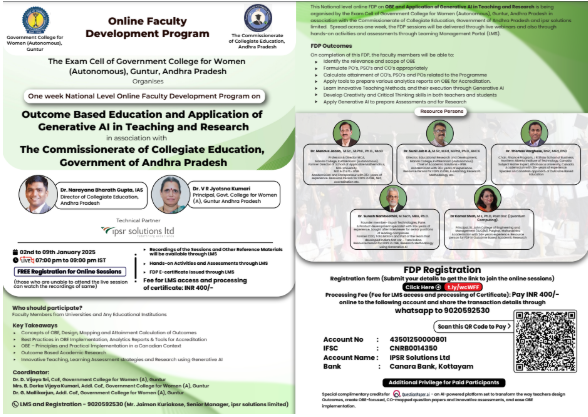
Participants in the Faculty Development Programme include Deans, Heads of Departments, and Faculty Members from Higher Educational Institutions across the Indian States and abroad.
1624 participants took part and benefitted from the seven-day Faculty Development Programme on Outcome Based Education and Application of Generative AI in Teaching and Research organised by The Exam Cell of Government College for Women, Autonomous, Guntur, Andhra Pradesh in association with The Commissionerate of Collegiate Education, Government of Andhra Pradesh.
The inaugural session of the one-week National Level Online Faculty Development Programme on Outcome Based Education and Application of Generative AI in Teaching and Research organised by the Exam Cell of St Government College for Women, Autonomous, Guntur, Andhra Pradesh in association with The Commissionerate of Collegiate Education, Government of Andhra Pradesh started at 7.00 PM on 02 January 2025.
Welcome Speech:
Mrs B Dorka Vijaya Kumari, Additional CoE, Government College for Women, Autonomous, Guntur who is also the coordinator of the FDP gave away the welcome speech. Ms Kumari is an Assistant Professor of Biochemistry who has organised National-level UGC workshops, created extensive educational content, and run a dedicated channel on Biology and Biochemistry. A recipient of the 2018 IASc Summer Research Fellowship, she has also served as a resource person for Faculty Development Programmes.
Inaugural Address:
Dr V Rama Jyotsna Kumari, the honourable Principal of Government College for Women, Autonomous, Guntur delivered the Inaugural Address. A PhD holder in Commerce, she began her career in 1992 as a lecturer at the Government Degree College for Women, Adilabad. She served at VSR Government Degree College, Movva as Principal before undertaking the current position. She is also the Regional Joint Director (FAC) for Zone 3 Guntur.
Special Invitee Address:
Dr Ch Tulasi, the current Deputy Director at RUSA, AP and a special invitee for the event delivered a special invitee address. With over two decades in academia and administration, Ms Tulasi has served as a Lecturer, Principal, and Academic Officer in Collegiate Education. A receiver of the State Best Teacher Award. and The DD Kosambi Award, and recognised as a National RBPT Master Trainer by IISER Pune, she has conducted 51 workshops to her credit.
Introduction of the FDP:
Dr Mendus Jacob, MD & COE of ipsr solutions limited, and Professor & Director of MCA, Marian College Autonomous, Kuttikkanam provided the introduction regarding the FDP to the participants. Dr Jacob has also served as a resource person for many National and International Seminars, Conferences and Faculty Development Programmes including UGC Sponsered Refresher Courses. Dr Jacob is associated with many educational institutions as chairman, member of various academic bodies, and mentor of many higher education institutions implementing outcome-based education. He is part of a team that has trained over 30,000 faculty members in outcome-based education.
Word of Thanks:
Dr G Seshu, Assistant Professor in English, Government College for Women, Autonomous, Guntur, delivered the Word of Thanks. Dr Seshu, specialising in eco-critical studies, new literature, children’s literature, and translation studies has published around 8 articles in various journals. She received the Appreciation Award as an LMS Content Developer and Master Trainer in HVPE from the Commissionerate of Collegiate Education.
Bloom’s Taxonomy is a framework that categorizes learning objectives into levels of complexity and specificity. Developed by Benjamin Bloom and his colleagues in 1956, it serves as a foundational guide for educators to design curriculum, assessments, and instructional strategies. The taxonomy is organized into three domains: Cognitive (knowledge-based), Affective (emotion-based), and Psychomotor (skill-based), with the Cognitive domain being the most widely applied in education.
The Cognitive domain outlines six hierarchical levels of learning: Remembering, Understanding, Applying, Analyzing, Evaluating, and Creating. These levels move from basic information recall to higher-order thinking skills like critical evaluation and innovation. Educators use this structure to ensure students not only acquire knowledge but also apply and analyze it in real-world contexts.
The Affective domain emphasizes emotional growth and attitudes, focusing on how students engage with and value what they learn. The Psychomotor domain, on the other hand, deals with physical skills and coordination. Together, these domains enable a holistic approach to education, addressing the intellectual, emotional, and practical aspects of learning.
Incorporating Outcome-Based Education (OBE) with Bloom’s Taxonomy ensures that learning objectives are clearly defined and measurable. Generative AI further enhances this process by providing personalized learning experiences, automating routine tasks, and offering instant feedback. This synergy empowers educators to create dynamic and adaptive teaching methods, fostering deeper engagement and improved learning outcomes for students.
The first task, Question Paper Analysis based on Bloom’s Taxonomy was assigned to the participants at the end of the first day’s session Bloom’s Taxonomy, Learning Domains by Dr Sunil Job.
Outcome-Based Education (OBE) is a learner-centric approach focusing on achieving clearly defined outcomes by aligning teaching strategies, assessments, and institutional goals. In the Canadian context, OBE serves as a transformative framework for ensuring that graduates have the knowledge, skills, and attitudes necessary to succeed in diverse, multicultural, and dynamic environments. Canadian institutions aim to produce globally competent and socially responsible graduates by prioritising measurable outcomes.
The core principles of OBE revolve around clarity of purpose, high expectations, and a commitment to continuous improvement. In Canada, these principles emphasize inclusivity, cultural diversity, and adaptability to meet the needs of a varied student population. Clear articulation of learning outcomes enables institutions to design curricula that bridge theoretical knowledge with practical applications, fostering student engagement and lifelong learning.
Implementing OBE in Canadian institutions involves curriculum mapping, outcome-based assessments, and active stakeholder participation. Faculty adopt innovative teaching methodologies such as project-based learning, experiential education, and technology integration to enhance student outcomes. Regular feedback loops between educators, students, and industry partners ensure that learning remains relevant and aligned with real-world demands.
The adoption of OBE in Canada reflects a commitment to preparing learners for the complexities of a rapidly changing world. By grounding education in clearly defined outcomes and fostering continuous improvement, Canadian institutions are setting benchmarks for academic excellence and global competitiveness. Through strategic implementation, OBE not only transforms individual learning experiences but also strengthens the broader educational ecosystem.
Dr K Bhanu Prakash, Assistant Professor, Zoology, Government College for Women, Autonomous, Guntur delivered the Word of Thanks after the second day’s session.
The third day’s session started with a brief introduction about the resource person by Dr M Kamala Karuna, Assistant Professor in Chemistry, Government College for Women, Autonomous, Guntur.
Outcome-Based Education (OBE) is a transformative approach to teaching and learning, emphasizing the achievement of well-defined outcomes that align with institutional vision and societal needs. The architecture of OBE is built upon three fundamental pillars: the definition of learning outcomes, alignment of curriculum and pedagogy, and continuous assessment and improvement. This framework ensures a learner-centric process that prioritizes skills, knowledge, and attitudes necessary for success in the real world.
The design of outcomes forms the backbone of OBE, starting with the articulation of Program Educational Objectives (PEOs) that reflect the long-term aspirations of the program. These PEOs are then broken down into more specific Program Outcomes (POs) and Course Outcomes (COs), ensuring a seamless alignment between institutional goals and the competencies students acquire. A well-designed outcome is measurable, achievable, and contextual, enabling educators to map the learning journey effectively.
OBE’s architecture also emphasizes backward design, where the desired outcomes guide the development of curriculum, teaching strategies, and assessments. This alignment ensures that every activity within the academic ecosystem contributes meaningfully to achieving the targeted outcomes. The iterative process of evaluation and feedback further strengthens the system by addressing gaps and fostering continuous improvement.
By adopting the OBE framework and focusing on meticulous outcome design, institutions empower students to emerge as competent professionals and lifelong learners. This results in a holistic learning experience that not only enhances individual potential but also contributes to societal growth and innovation.
The Word of Thanks was delivered by Dr Ajay Kumar, Assistant Professor in Economics, Government College for Women Autonomous, Guntur.
The second task ‘Course Outcome and Quality Check’ was given as a Workshop Activity to the participants after the third day’s session.
Dr Shaheda Akthar, Assistant Professor, of Computer Science made a brief introduction to the Resource Person on the fourth day of the FDP session and later delivered the Word of Thanks to all those present. Outcome-Based Education (OBE) emphasizes achieving clearly defined learning outcomes to ensure that students acquire the intended skills and competencies. Central to this approach is the systematic mapping of outcomes, where Course Outcomes (COs) align with Program Outcomes (POs) and Program Specific Outcomes (PSOs). This alignment ensures coherence between the learning objectives at the course and program levels, creating a structured pathway for measurable academic excellence.
To evaluate the effectiveness of this alignment, the calculation of attainment plays a crucial role. By analyzing students’ performance through direct and indirect assessments, institutions can measure the degree to which predefined outcomes are achieved. These calculations provide insights into the success of instructional strategies and help in identifying areas for improvement to bridge learning gaps.
Advancements in ICT tools for OBE, such as deQ OBE and QnSmart i, have transformed the way institutions manage outcomes, calculate attainments, and generate analytical reports. These tools offer automated processes for mapping, data-driven insights into outcome attainment, and comprehensive reports for accreditation and continuous improvement. By integrating technology into the OBE framework, institutions can ensure transparency, efficiency, and precision in their academic processes.
In summary, leveraging ICT tools for mapping outcomes, calculating attainment, and generating analytical reports is essential for achieving academic rigour in OBE. This modern approach empowers educators to enhance quality, meet accreditation standards, and prepare students for a competitive world.
After the session by Dr Mendus Jacob, two separate tasks ‘Formulation of Assessment Questions with Respect to a Course Outcome and to Find the Mapping Strength’, and ‘ CO Computation Prototype Model’ were assigned to the participants to check their understanding of the topic.
Outcome-Based Academic Research (OBAR) is a transformative approach that aligns scholarly endeavours with clearly defined outcomes. Unlike traditional research models that often focus on processes or outputs, OBAR emphasizes achieving specific goals that directly contribute to societal, academic, or industry needs. By fostering a results-oriented mindset, it ensures that research efforts yield measurable and impactful results.
Central to OBAR is the integration of well-defined objectives, rigorous methodologies, and continuous assessment. Researchers are encouraged to establish clear deliverables, such as solutions to real-world challenges, policy recommendations, or advancements in technology. This structured framework not only enhances accountability but also drives innovation by encouraging researchers to remain focused on achieving predefined milestones.
OBAR also promotes interdisciplinary collaboration, as addressing complex global issues often requires expertise from multiple domains. By facilitating partnerships across academia, industry, and government, it bridges the gap between theoretical knowledge and practical applications, thereby maximizing the relevance and utility of research outcomes.
In an era where research impact is increasingly scrutinized, Outcome-Based Academic Research provides a robust framework for ensuring that scholarly contributions are meaningful, sustainable, and aligned with broader developmental goals. It represents a forward-thinking paradigm that empowers researchers to contribute effectively to knowledge creation and societal progress.
Mapping of Outcomes: Dr Mendus Jacob
Mapping of outcomes is a critical process in educational and organizational contexts, enabling the alignment of objectives, actions, and results. It involves establishing a clear connection between the intended goals (outcomes) and the activities or inputs designed to achieve them. This process ensures that efforts are systematically directed toward measurable and meaningful achievements, particularly in Outcome-Based Education (OBE).
In the context of OBE, mapping outcomes involves linking Program Outcomes (POs), Course Outcomes (COs), and Learning Outcomes (LOs). It helps educators identify whether the teaching-learning processes and assessments are effectively contributing to the overarching goals of a program. Such mapping not only fosters transparency and accountability but also aids institutions in adhering to accreditation standards.
Beyond education, outcome mapping is widely used in project management and strategic planning. Organizations use it to measure the impact of their initiatives by tracing the pathways from input to outcome. This ensures that resources are allocated efficiently and that all stakeholders remain aligned with the desired objectives.
By focusing on the alignment and evaluation of outcomes, mapping provides a structured approach to achieving excellence. It fosters informed decision-making, encourages continuous improvement, and ensures that goals are achieved systematically.
The fifth task, submitting an article on ‘Innovative Practices in Teaching and Learning’ for Publishing Online was assigned to the participants after the session.
Dr G Seshu, Assistant Professor in English made the introduction to the Resource Person and later delivered the Word of Thanks on the sixth day of the FDP session.
Outcome-Based Education (OBE) has redefined the landscape of teaching by shifting the focus from what educators teach to what students achieve. Centred on well-defined learning outcomes, OBE encourages a student-centric approach that promotes critical thinking, practical application, and lifelong learning. The integration of Generative AI into teaching has further enhanced the effectiveness of OBE by offering personalized, adaptive, and innovative learning experiences.
Generative AI, with its ability to analyze vast amounts of data and generate human-like responses, complements the OBE framework by addressing diverse learning needs. AI-driven tools can create customized learning materials, assess student performance, and provide targeted feedback, ensuring every learner progresses towards the intended outcomes. By automating routine tasks, these tools also free educators to focus on mentoring and higher-order pedagogical activities.
Moreover, Generative AI fosters an engaging learning environment through simulations, interactive content, and intelligent tutoring systems. These capabilities align with OBE’s emphasis on practical and experiential learning, preparing students for real-world challenges. The synergy between OBE and Generative AI not only transforms the teaching-learning process but also equips students with the skills and adaptability required for the dynamic demands of the future.
Incorporating Generative AI into OBE marks a pivotal shift towards a more responsive and inclusive education system. This integration empowers educators and learners alike, ensuring quality education and fostering innovation in teaching methodologies.
The final day’s session started with a brief introduction about the resource person by Dr Shanthi Sridevi, Assistant Professor in English, Government College for Women, Autonomous, Guntur.
Generative AI is revolutionizing the research landscape by providing powerful tools to enhance creativity, efficiency, and accuracy. These AI systems, powered by advanced machine learning models like GPT, can generate human-like text, produce realistic images, and even simulate data patterns. By automating time-consuming tasks, researchers can focus on deeper analysis and innovation.
One of the most significant advantages of generative AI is its ability to process and synthesize large volumes of data. Researchers can leverage these models to generate summaries, draft reports, or explore new hypotheses by analyzing patterns in existing datasets. Additionally, these tools enable simulations that aid in predicting outcomes, optimizing experiments, and visualizing complex scenarios.
Generative AI also fosters interdisciplinary collaboration by making cutting-edge technologies accessible to researchers from diverse fields. Whether it’s drafting scientific publications, creating visual aids, or generating novel ideas, these tools reduce barriers and enhance productivity. Furthermore, they serve as an invaluable resource in education and training by creating tailored content for specific learning objectives.
While the potential of generative AI is immense, ethical considerations remain crucial. Ensuring data privacy, avoiding biases in generated outputs, and maintaining transparency is vital to its responsible use. By addressing these challenges, generative AI can continue to be a transformative force in shaping the future of research.
Dr G Seshu, Assistant Professor in English, Government College for Women, Autonomous, Guntur delivered the Word of Thanks on the final day of the one-week online Faculty Development Programme.
Mrs B Dorka Vijaya Kumari, Additional CoE, Government College for Women, Autonomous, Guntur who is also the coordinator of the FDP delivered the concluding remarks.
Click to watch the video recording of the seventh day’s session, Generative AI in Research by Dr Suresh Namboothiri.
Join us for FREE to get instant email updates!
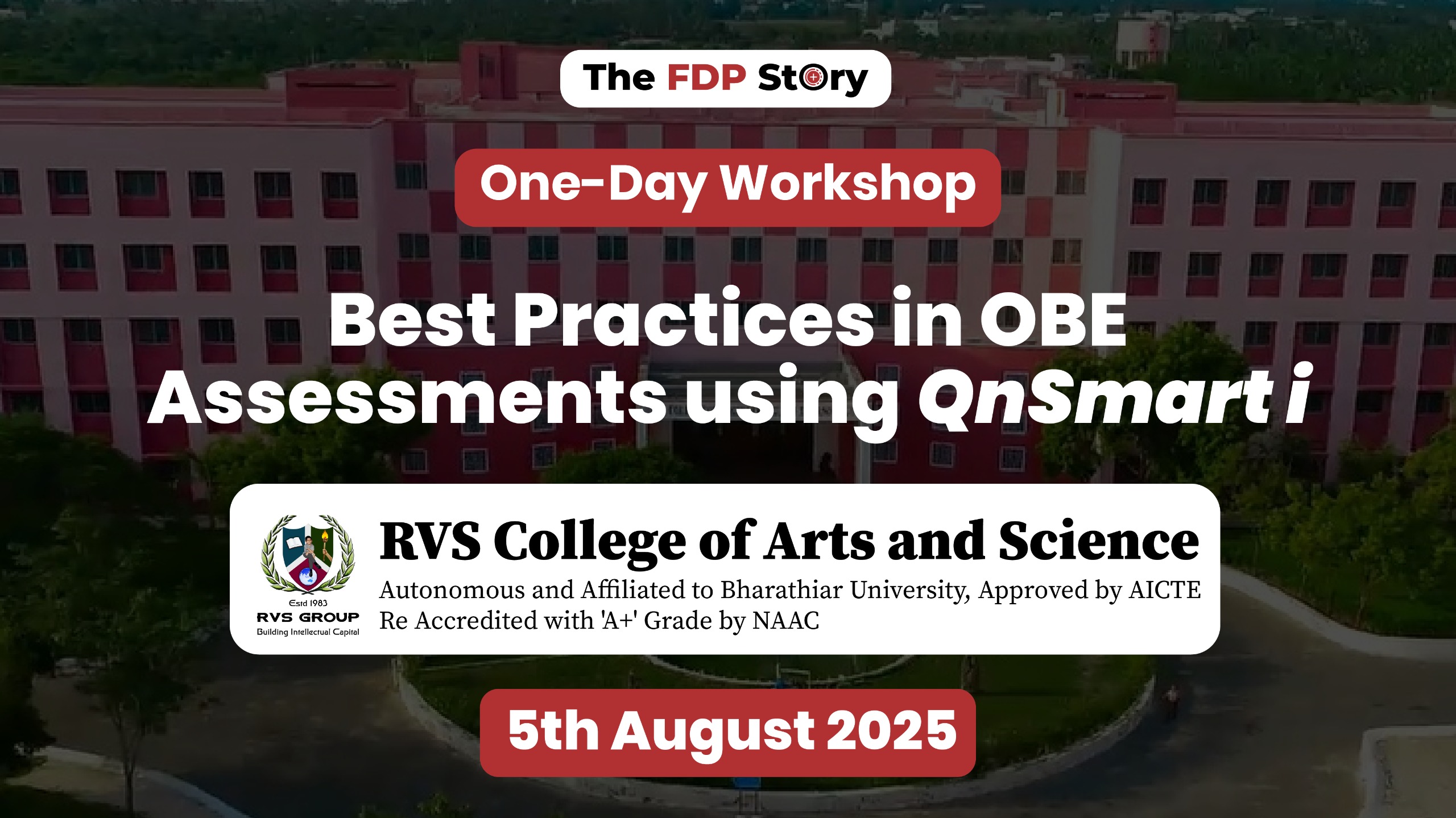
The Internal Quality Assurance Cell (IQAC), in collaboration with the […]
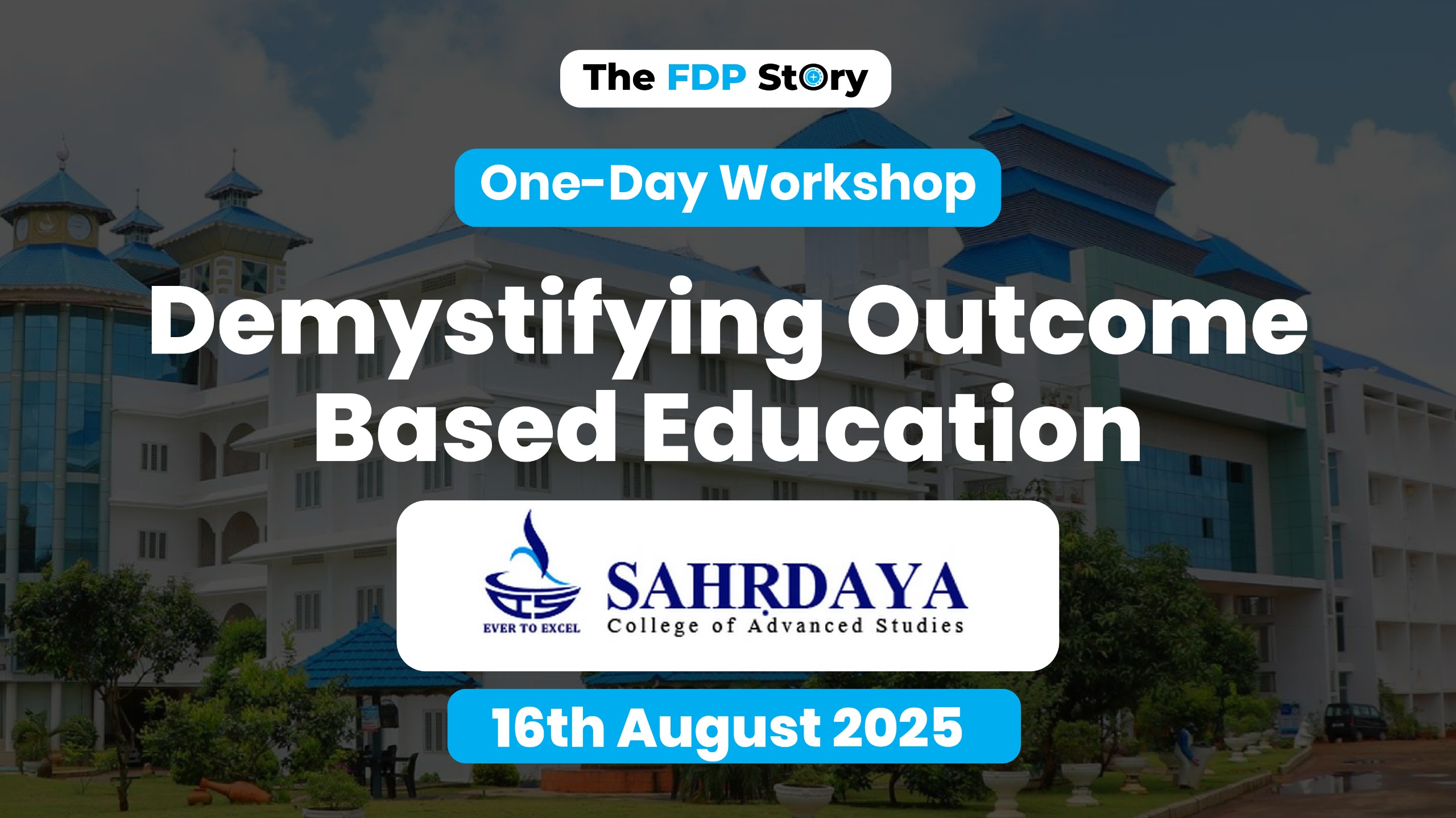
A one-day workshop on Demystifying Outcome-Based Education (OBE) was successfully […]
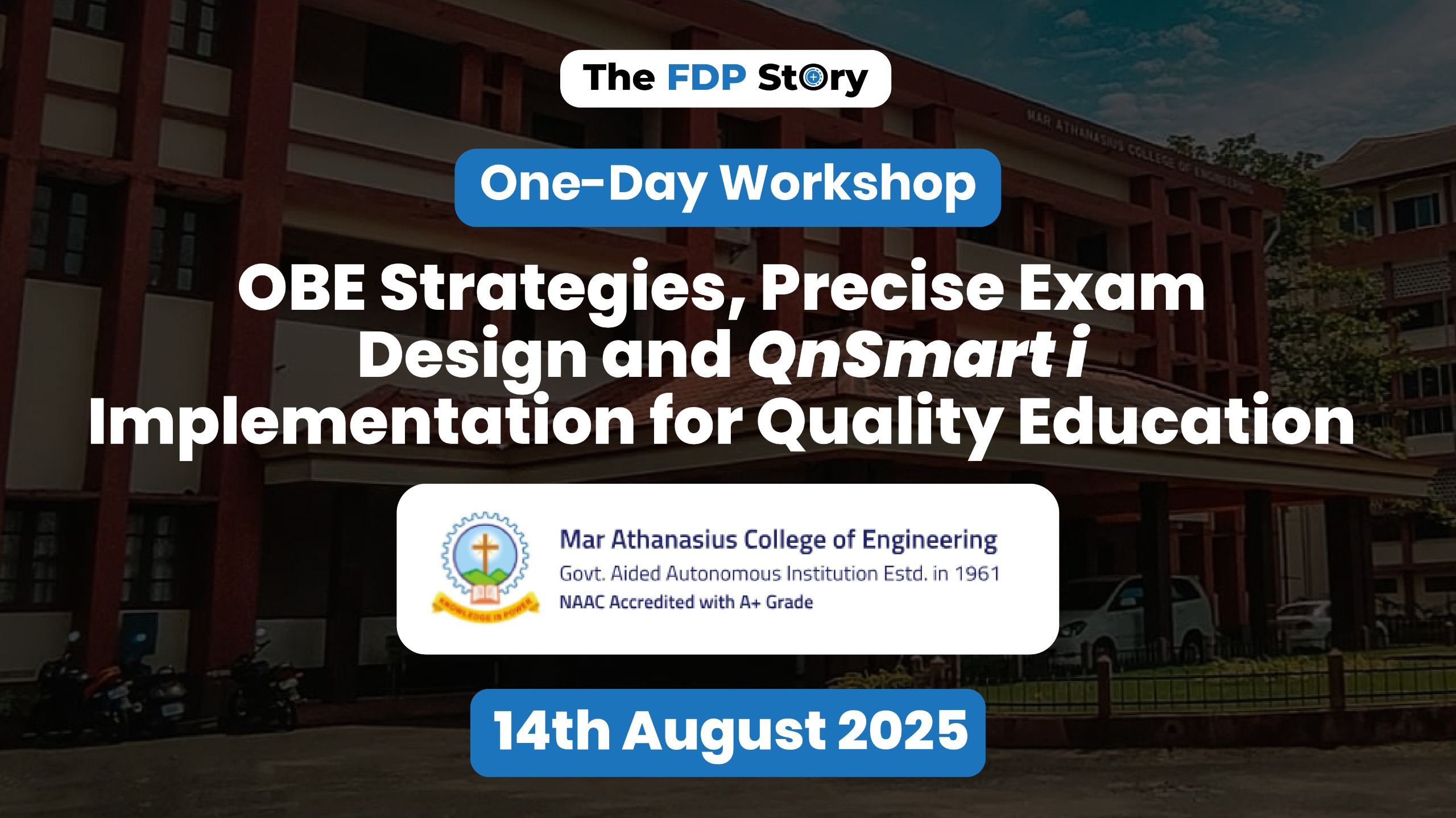
As part of Mar Athanasius College of Engineering’s continuous pursuit […]
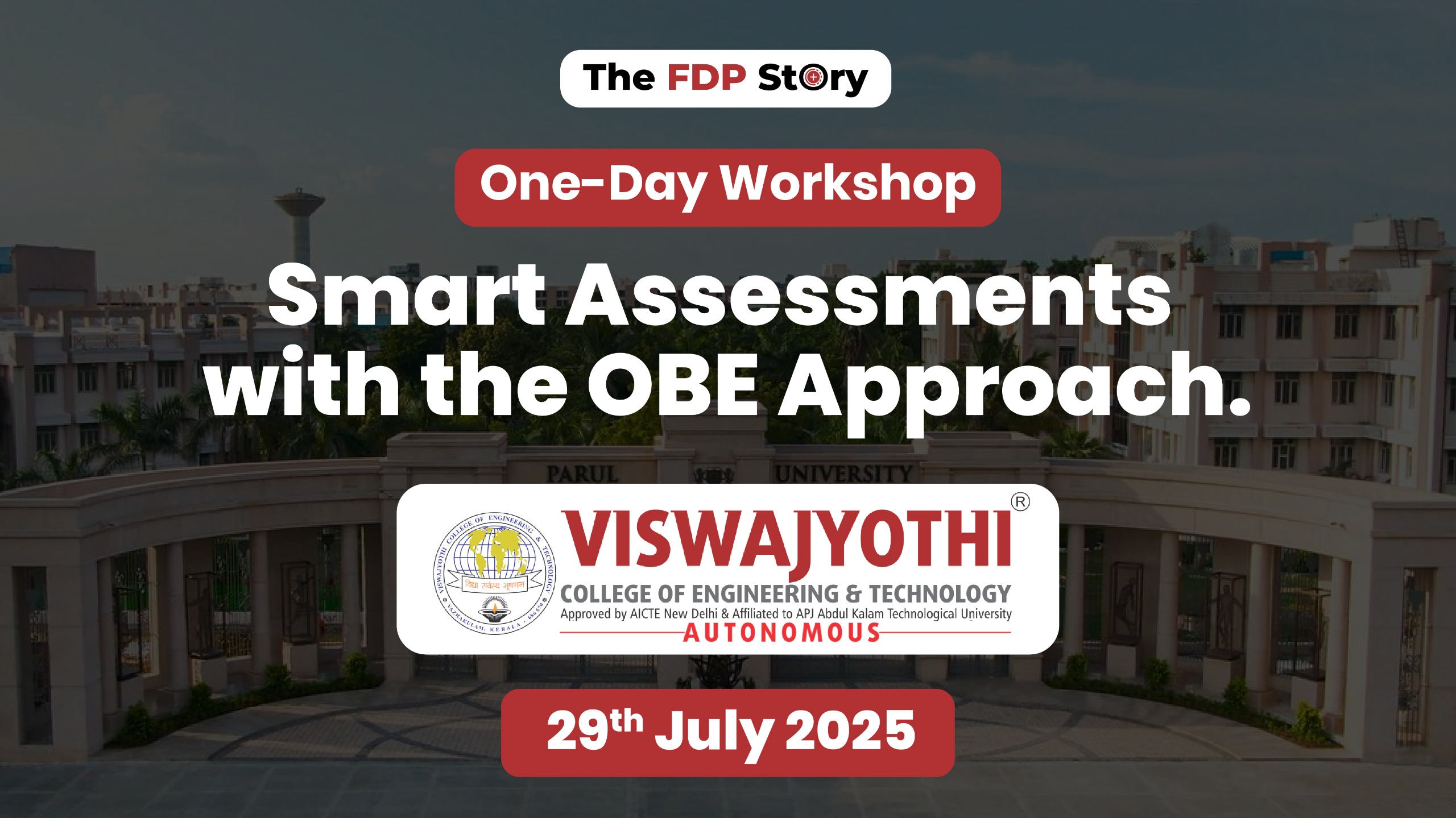
A one-day workshop on Smart Assessments with the OBE Approach […]
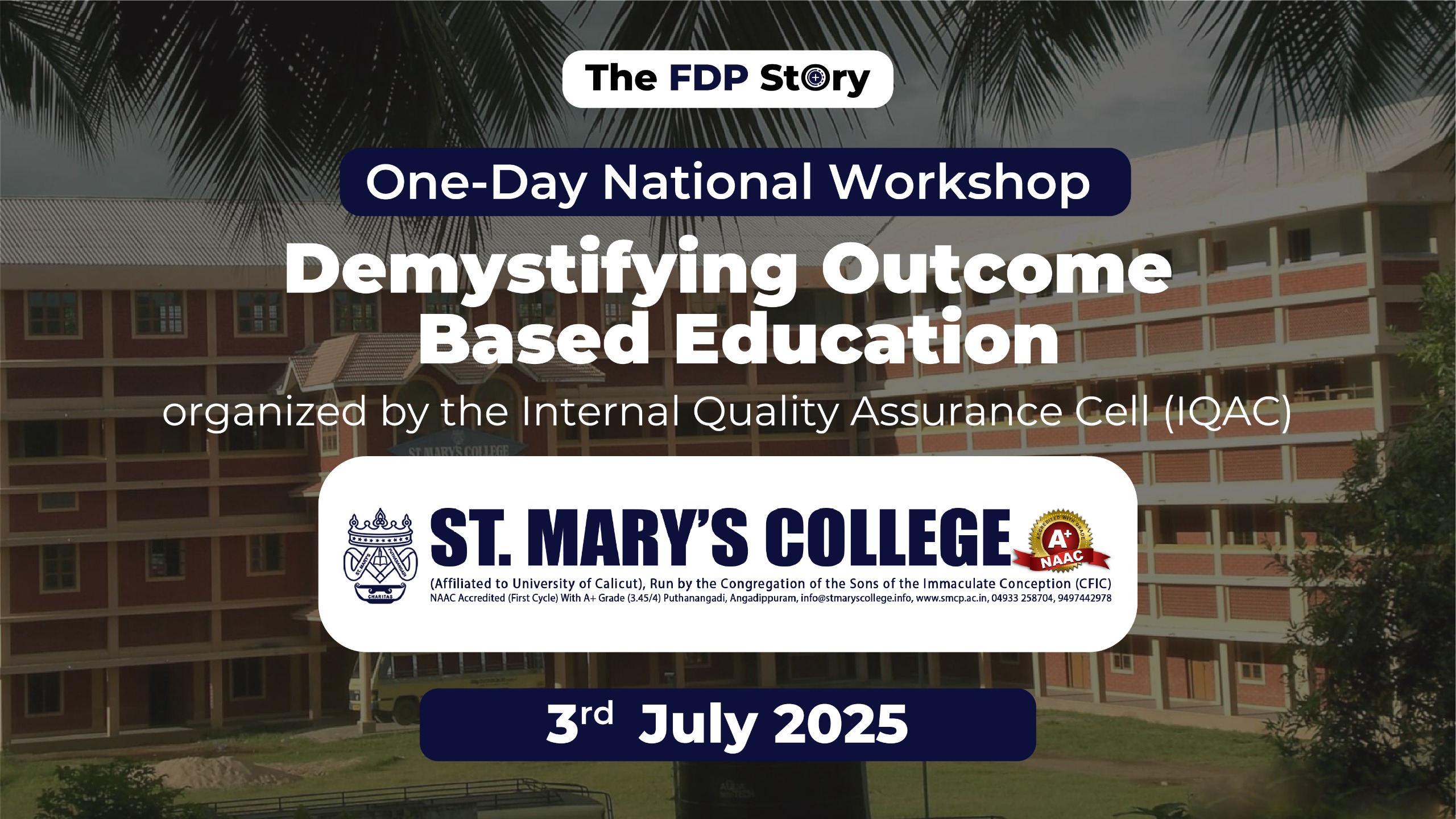
A one-day national-level workshop on Demystifying Outcome-Based Education (OBE) was […]
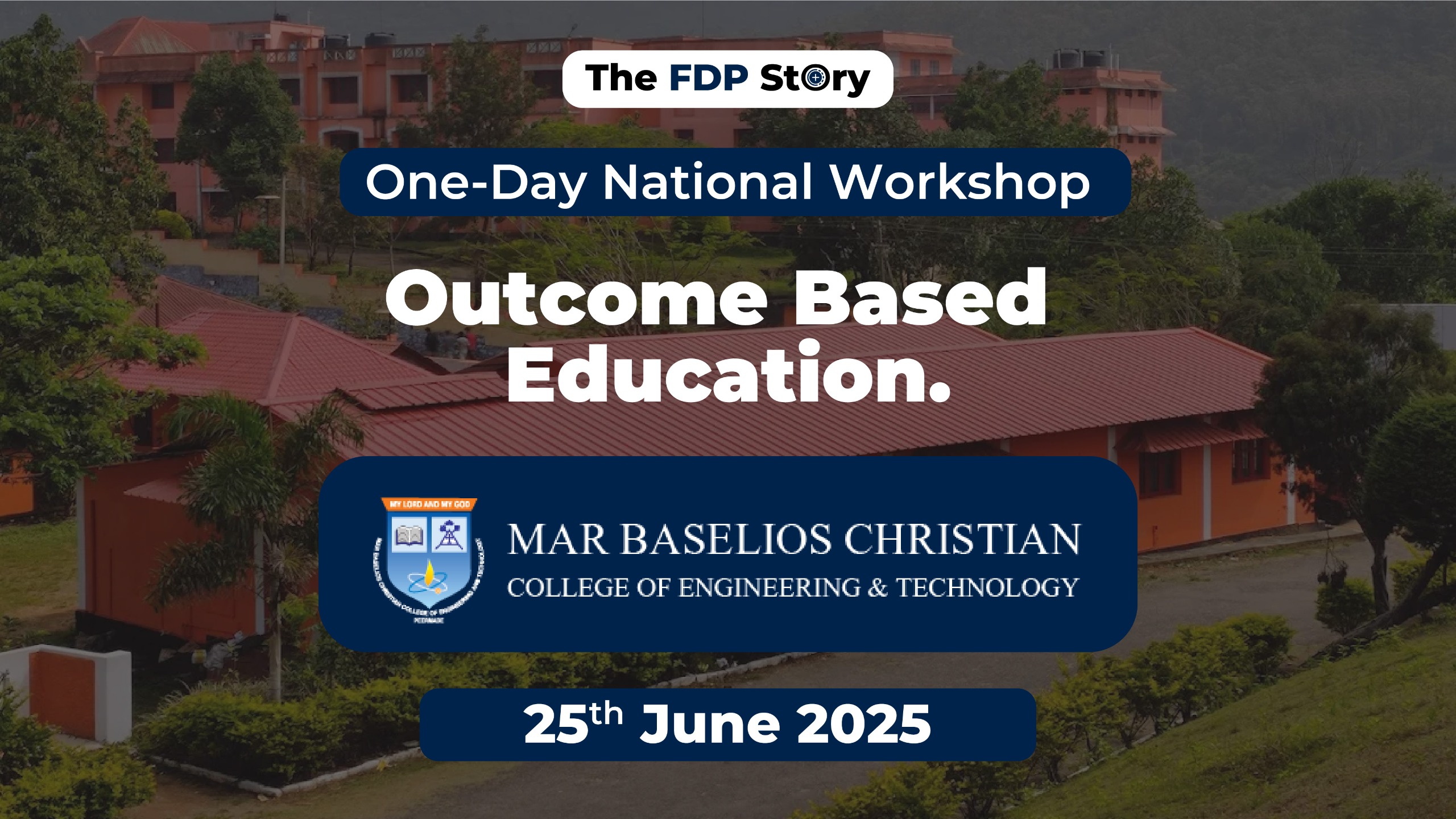
The Faculty Development Programme on Outcome Based Education (OBE) was […]

St. John Group of Institutions, under the Aldel Education Trust, […]
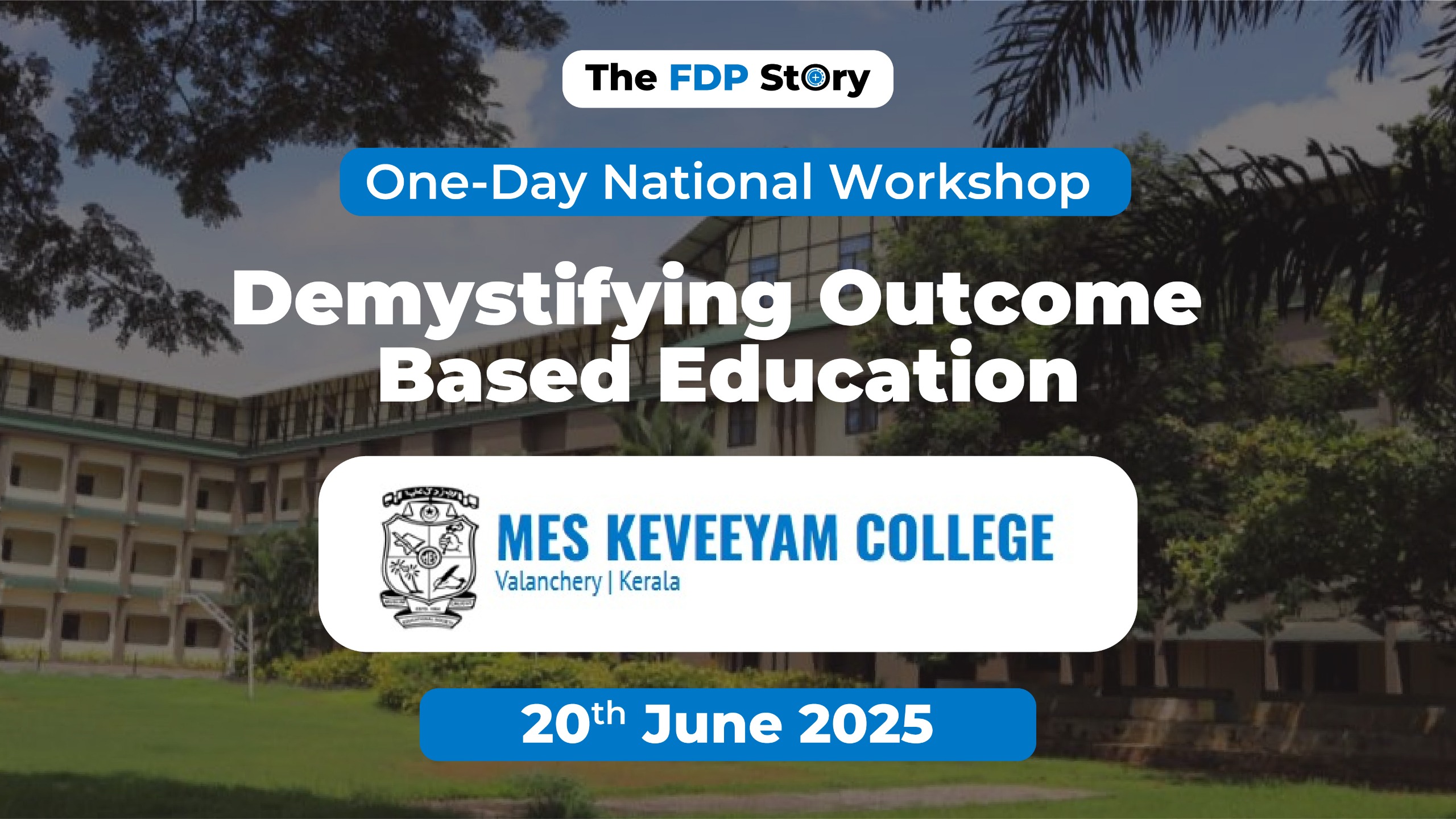
MES KEVEEYAM College, Valanchery, Malappuram, successfully hosted a One-Day National […]

As part of Parul University’s continued commitment to enhancing academic […]
Leave A Comment